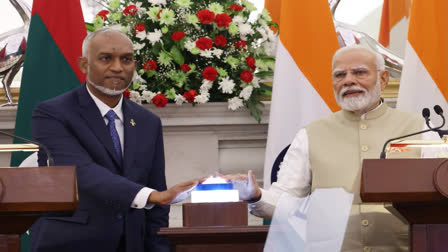The significance of the State visit of the President of Maldives to India (October 6-10, 2024) can best be assessed in the backdrop of how India-Maldives relations have evolved since the election of Mohamed Muizzu as the President of Maldives in November 2023.
First and foremost, Muizzu rose to power on a strong "India Out" campaign and appeared keen to deliver quickly on the promises he made during his election campaign. The first act of Muizzu's government thus was to formally demand the withdrawal of Indian military personnel from Maldives, who had been deployed there to operate the aircraft and Helicopter (gifted by India) for the purposes of medical evacuations and surveillance of Maldives waters in the Indian Ocean in the interests of Maldives’ security.
Prime Minister Modi meets the President of Maldives, Dr. Mohamed Muizzu at Hyderabad House, in New Delhi on October 07, 2024 (Press Information Bureau) Muizzu also ordered the review of agreements concluded by the previous government with India. Simultaneously, President Muizzu appeared to give a message that in its foreign policy space, Maldives gives priority to its relation with China over India; this was reflected in his decision to choose China for his first official visit rather than India, in the course of which Maldives concluded inter-alia defence cooperation agreements with China.
Resultantly, the relations between India and Maldives came under severe strain. However, as evident from the subsequent developments, the situation was to be short-lived.
Prime Minister Modi meets the President of Maldives, Dr. Mohamed Muizzu at Hyderabad House, in New Delhi on October 07, 2024 (Press Information Bureau) To begin with, India, in its response to Maldives's seemingly anti-India rhetoric and pro-China card, displayed a great deal of maturity. India agreed to withdraw its military personnel but successfully secured an agreement from the Maldives under which the Indian military personnel were to be replaced by the civilians from India to operate the aircraft and Helicopter which Maldives agreed to retain.
President Muizzu obviously understands the importance of geo-political and geographical ground realities and the importance of engaging India – its largest and geographically closest neighbour in the Indian Ocean. Once the issue of Indian military personnel was resolved to the mutual satisfaction of both countries, President Muizzu trod with caution and ensured that there was no further damage to bilateral relations caused by actions from his side.
He was quick in dismissing the Maldivian Ministers who made derogatory remarks against the Indian PM at the end of December last year. In December 2023 President Muizzu met with the Indian PM Modi on the sidelines of COP 28 in Dubai and agreed to set up a Core Group to deepen the partnership between the two countries. In August 2024, he received India’s External Affairs Minister, who paid an official visit to Maldives to carry the dialogue further and to prepare the ground for President Muizzu's visit to India.
Prime Minister Modi along with the President of Maldives, Dr. Mohamed Muizzu at the Exchange of MoUs at Hyderabad House, in New Delhi on October 07, 2024. (Press Information Bureau) President Muizzu’s October ’24 State visit to India was productive in more than one sense. First and foremost, it confirmed that the relations between the two countries are now back on track. Further, Muizzu made important public statements to assure India that "Maldives would never do anything that undermines the security of India", adding that "Maldives is "confident that our engagements with other nations (an implied reference to China) will not undermine India’s security interests"(Muizzu’s interview with Times of India).
On the substantive side, besides the signing of important bilateral agreements, India and Maldives unveiled a vision document which reveals the main directions in which the relations are likely to move in future. The thrust would be on cooperation in economic spheres and maritime security in the Indian Ocean region.
India will continue to assist Maldives through development cooperation projects across areas, including ports, airports, housing, hospitals, road networks, sports facilities, schools, water and sewerage, housing etc., while working on the timely completion of the flagship Greater Male Connectivity project.
The currency swap agreement (under which RBI will provide $400 million and 30 billion to support short-term foreign exchange liquidity and balance of payments stability in Maldives) reflects India's commitment to help its neighbour to tide over financial difficulties.
From India’s perspective, Maldives is an important neighbour in the strategically crucial Indian Ocean region and also in the context of India's Neighbourhood First policy and Mission SAGAR (Security and Growth For All in the Region).
In its international relations, India follows the policy of multi-engagement. Therefore, India is not averse to Maldives (or any other neighbouring country) also engaging China or any other major player so long as they do not indulge in any activities which are detrimental to India's national, including security, and interests.
The Maldives' return to a stable relationship with India is thus a source of relief from avoidable tensions in bilateral relations with implications for the region. India’s deft diplomacy and Maldives' switch to a realistic approach have helped prevent Maldives from becoming a source of concern and irritant for India which in turn is in the overall interest of a conducive atmosphere in South Asia and the Indian Ocean Region.
(Disclaimer: The opinions expressed in this article are those of the writer. The facts and opinions expressed here do not reflect the views of ETV Bharat)
